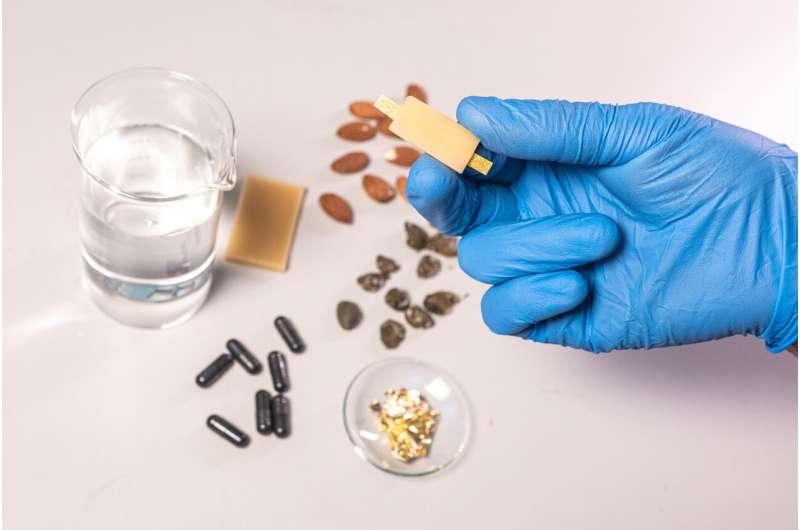


 8:44:8
8:44:8  2023-04-17
2023-04-17  950
950

A team of researchers at the Istituto Italiano di Tecnologia (IIT-Italian Institute of Technology) has created a totally edible and rechargeable battery, starting from materials that are normally consumed as part of our daily diet. The proof-of-concept battery cell has been described in a paper, recently published in the Advanced Materials journal. The possible applications are in health diagnostics, food quality monitoring and edible soft robotics.
The study has been realized by the group of Mario Caironi, coordinator of the Printed and Molecular Electronics laboratory of the IIT Center in Milan (Italy); Caironi has been focusing on the study of the electronical properties of food and its by-products, in order to unite them with edible materials and create new edible electronic materials. In 2019, Caironi won a 2-million-euro ERC consolidator grant for the ELFO Project, which explores the edible electronics field.
Edible electronics is a recently growing field that could have a great impact on the diagnosis and treatment of gastrointestinal tract diseases, as well as on the food quality monitoring. One of the most interesting challenges in the development of future edible electronic systems is to realize edible power sources.
The IIT's research group took inspiration from the biochemical redox reactions that happens in all the living beings, and developed a battery that utilizes riboflavin (vitamin B2, found for example in almonds) as anode and quercetin (a food supplement and ingredient, present in capers, among others) as cathode. Activated charcoal (a widespread over-the-counter medication) was used to increase electrical conductivity, while the electrolyte was water-based. The separator, needed in every battery to avoid short circuits, was made from nori seaweed, the kind found in sushi. Then, electrodes were encapsulated in beeswax from which two food-grade gold contacts (the foil used by pastry chefs) on a cellulose derived support come out.
The battery cell operates at 0.65 V, a voltage low enough not to create problems in the human body when ingested. It can provide current of 48 μA for 12 minutes, or a few microamps for more than an hour, enough to supply power to small electronic devices, such as low-power LEDs, for a limited time.
This example of fully edible rechargeable battery, the first one ever made, would open the doors to new edible electronic applications.
"Future potential uses range from edible circuits and sensors that can monitor health conditions to the powering of sensors for monitoring food storage conditions. Moreover, given the level of safety of these batteries, they could be used in children toys, where there is a high risk of ingestion. Actually, we are already developing devices with greater capacity and reducing the overall size. These developments will be tested in future also for powering edible soft robots," pointed out the research coordinator Mario Caironi.
"This edible battery is also very interesting for energy storage community. Building safer batteries, without usage of toxic materials, is a challenge we face as battery demand soars. While our edible batteries won't power electric cars, they are a proof that batteries can be made from safer materials than current Lithium batteries. We believe they will inspire other scientists to build safer batteries for truly sustainable future," added Ivan Ilic, co-author of the study.
Reality Of Islam |
|

Labor short

A new ultra

Batteries p
 9:3:43
9:3:43
 2018-11-05
2018-11-05
10 benefits of Marriage in Islam
 7:5:22
7:5:22
 2019-04-08
2019-04-08
benefits of reciting surat yunus, hud &
 9:45:7
9:45:7
 2018-12-24
2018-12-24
advantages & disadvantages of divorce
 11:35:12
11:35:12
 2018-06-10
2018-06-10
 6:0:51
6:0:51
 2018-10-16
2018-10-16
 8:3:0
8:3:0
 2018-06-21
2018-06-21
 2:34:48
2:34:48
 2022-01-18
2022-01-18
 9:39:36
9:39:36
 2022-12-28
2022-12-28
 3:18:29
3:18:29
 2022-12-24
2022-12-24
 7:6:7
7:6:7
 2022-03-21
2022-03-21
 6:14:17
6:14:17
 2018-06-21
2018-06-21
 12:47:1
12:47:1
 2022-12-20
2022-12-20
 5:41:46
5:41:46
 2023-03-18
2023-03-18
| LATEST |